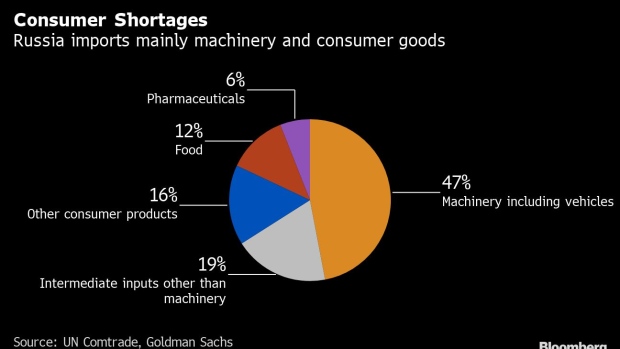Mar 24, 2022
Panicked Russians Don’t Buy Official Advice That Economy Is Fine
, Bloomberg News

(Bloomberg) -- As Russians have turned to panic-buying in the wake of President Vladimir Putin’s invasion of Ukraine, one item remains in plentiful supply -- official reassurances that everything is under control.
The government has rushed out near-daily declarations that essential staples remain plentiful in an economy blindsided by war and sweeping international sanctions.
Food? Nothing to worry about, said Agriculture Minister Dmitry Patrushev. There’s an abundance of diapers and sanitary pads, according to the Industry and Trade Ministry. No deficit of fever-reducing drugs either. As for flour, St. Petersburg has enough.
But the word isn’t getting through.
With price pressures already building before the war and global supply chains under strain, Russians are now contending with the new reality of economic isolation by hoarding more than common doomsday shopping favorites.
Bags of sugar from major companies have been out of stock on some websites, replaced by no-name brands selling at three times the price. Sanitary towels, diapers, pet food and coffee capsules are among other goods in high demand, with local items produced by international companies or with imported materials growing especially scarce.
Russia is on track for one of the deepest recessions in its modern history after the ruble crashed and commerce seized up as foreign suppliers of everything from food to cars limit or stop doing business in the country. Although officials acted quickly to head off a bank run and restore some calm in financial markets with capital controls and an emergency interest-rate hike, they have no quick fix for the consumer frenzy.
A March 15-22 survey found that a quarter of Russians stocked up for the future in recent days, largely by buying non-perishables like pasta and household chemicals.
Weekly numbers compiled by Russia’s biggest lender, Sberbank, show consumer spending has been increasing at an annual pace of as much as 25% this month, compared with single-digit increases before the invasion.
“It will take a very long time for the Russian economy to adapt to the situation,” Ksenia Mishankina, a research analyst with Loomis, Sayles & Co., said in an email. “Despite the government’s efforts over the years aimed at weaning Russia off a reliance on imported medicines, the impact has been limited.”
At stake is the ability of Russia’s economy to muddle through as Putin’s military offensive in Ukraine enters its second month. Before the war, the country counted on consumer spending for more than half of all economic activity.
Authorities have set margin limits for essential goods and Russian retailers including X5 Retail Group restricted purchases of “socially important” food items earlier this month following reports of hoarding.
Still, inflation has shown little sign of letting up. Some economists forecast it may reach as high as 25%, a level not seen in Russia since the government’s 1998 debt default.
In a flashback to the Soviet era, the panic buying has emptied shelves, increasingly putting supply under pressure. One online seller said the cost of office paper has risen as much as five times since last month.
Medicine prices are meanwhile rising up to 40%, according to Russia’s health watchdog. Russian doctors see shortages of more than 80 drugs including Nurofen for children, according to a survey.
What Our Economists Say:
“The sanctions shock to supply is pushing up prices much faster than we’d expect from the plunge in the ruble. The initial burst might be driven by outright shortages as well as panic buying, but inflation could accelerate for months as the disruption ripples through supply chains.”
--Scott Johnson.
Other niches of the market are easier to replenish, a reflection of a changing trade landscape as Putin redraws alliances. Russia’s safety watchdog allowed to resume shipments of some fruits from five countries, including China on March 5.
Hygiene products are another case in point, after Always sanitary pads producer Procter & Gamble reduced its business in Russia. It’s hardly making every consumer happy.
“Shop shelves are now full of sanitary napkins from brands I don’t know with names in Chinese characters, sometimes at double the price that Always or Libresse were just weeks ago,” said Larisa, a 46-year-old housewife in Lipetsk south of Moscow.
©2022 Bloomberg L.P.





